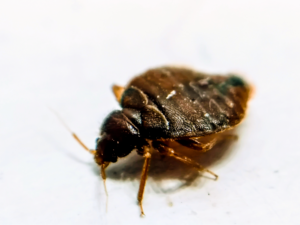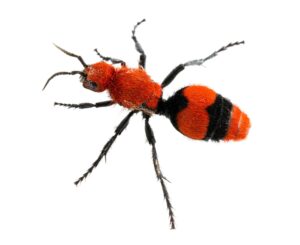Home / Blog / Using Peppermint Oil for Mice: Does it Actually Work?
Using Peppermint Oil for Mice: Does it Actually Work?

Scientifically reviewed by Rachel Maldonado
-Published on June 10, 2024
-Updated on August 23, 2024
Using Peppermint Oil for Mice: Does it Actually Work?
Ah, mice. They might be small, but the problems they create – from chewing through wires to contaminating food – are anything but.
If you’ve been scouring the web for natural remedies, you might have heard that peppermint oil can keep mice at bay – but does it actually work, or is this just another gimmick (albeit a nice-smelling one)?
Let’s take a closer look.
What is Peppermint Oil?
Peppermint oil is known for its refreshing scent and numerous uses in aromatherapy and cooking. It’s a natural essential oil derived from the peppermint plant (Mentha piperita) through steam distillation of the leaves.
Known for its refreshing and cooling aroma, as well as its potential health and wellness benefits it’s often used in aromatherapy.
But when it comes to pest control, the idea is that mice find the strong smell of peppermint oil overwhelming and unpleasant.
This theory suggests that a few strategically placed drops of peppermint oil could be enough to send these rodents scurrying in the other direction.
How to Use Peppermint Oil for Mice

If you decide to give peppermint oil a try, here’s how you can use it effectively:
- Cotton Balls: Soak cotton balls in peppermint oil and place them in areas where you’ve noticed mouse activity. Common spots include under sinks, in the pantry, and near entry points like doors and windows.
- Spray Solution: For a broader solution than just a few cotton balls can provide, consider mixing 10-15 drops of peppermint oil with water in a spray bottle. Spritz this mixture around baseboards, cracks, and other potential entry points.
- Diffusers: You can also use essential oil diffusers to spread the scent throughout larger areas of your home, such as basements or attics.
While you might not notice a huge difference in your mouse population when you use these remedies, they don’t hurt – and you may find that they help repel some other pests (including flying insect pests like flies) as well.
Not only that, but the aroma of peppermint is relaxing and therapeutic, so it offers a pleasant touch that doubles as a functional pest control measure.
What the Research Says About Peppermint Oil for Mice
While the idea of using peppermint oil to deter mice is appealing, scientific evidence supporting its effectiveness is limited. Here’s what we know.
First, mice have a strong sense of smell, and some studies suggest that certain strong odors (in this case, perhaps even peppermint) can indeed repel them. However, these effects are often temporary, as mice can become accustomed to the smell over time, and there aren’t many studies demonstrating how effective peppermint is specifically for repelling mice.
The anecdotal evidence is also mixed. Some homeowners swear by peppermint oil, claiming it has kept their homes mouse-free. Others report no noticeable difference in mouse activity. Either way, peppermint oil is generally safe for most people to use, so it likely won’t hurt to try.
Pros and Cons of Using Peppermint Oil
Before you rush out to buy peppermint oil, consider the pros and cons.
First, some advantages:
- Natural and Non-Toxic: Peppermint oil is a natural alternative to chemical pesticides.
- Pleasant Smell: Unlike some pest control methods, peppermint oil leaves your home smelling fresh and clean.
- Easy to Use: Applying peppermint oil is simple and doesn’t require any special equipment.
And then there are the downsides:
- Temporary Solution: Peppermint oil may only provide short-term relief. Mice can adapt to the smell, making it less effective over time.
- Limited Coverage: For large infestations, peppermint oil alone may not be enough to solve the problem.
- Maintenance: You need to reapply the oil regularly to maintain its potency.
Combining Peppermint Oil with Other Methods
To boost your chances of success, consider combining peppermint oil with other pest control strategies.
First, seal off any entry points. You can use steel wool and caulk to seal cracks and gaps where mice might enter.
Do your best to keep your place clean. Your floors don’t need to be clean enough to eat off, as your grandmother might say, but you need to do your best to eliminate or at least reduce potential attractants. Keep your home clean and free of any food debris.
If you spot any mice around your home use humane traps to capture and remove mice. And if you’re dealing with a significant infestation, professional pest control services can provide a more comprehensive solution than solely trapping or baiting the rodents. Remember, if you see one mouse, there are likely many more.
The Final Verdict: Is Peppermint Oil Worth a Try?
While peppermint oil can be a helpful tool in your pest control arsenal, it’s unlikely to be a standalone solution for serious infestations. Its natural, non-toxic nature makes it an attractive option for those seeking eco-friendly methods, but its effectiveness may vary.
If you’re dealing with a minor mouse problem and prefer a natural approach, give peppermint oil a try. Just remember to combine it with other preventive measures for the best results.
For persistent or significant infestations, don’t hesitate to reach out to professionals. At Hawx Pest Control Virginia Beach VA, we specialize in providing effective, comprehensive solutions tailored to your needs. Join our satisfied family of customers and enjoy a mouse-free home. Contact us today to learn more!
Related Articles
Visit our blog to learn more.
→





